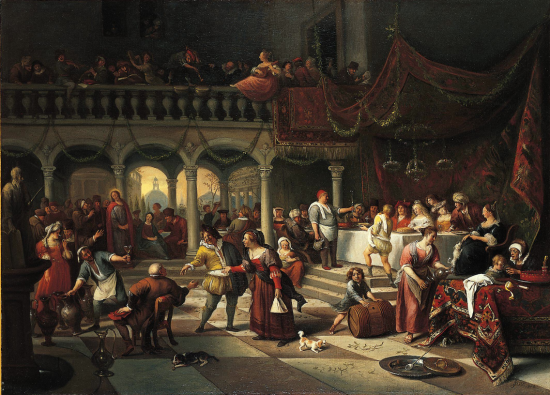The Wedding at Cana is the Mystery of the Body: with all its faults, the Body is very, very good.
There's a whole lot one can say about Jesus' miracle at the wedding at Cana. There's a link with the water of baptism and the wine-become-blood of the Holy Eucharist; there's a link with the third day of creation and Christ's three days in the tomb. And then there's the basic fact: Jesus and his disciples and his mother went to a wedding; and Jesus' first public miracle was done to spare the host embarrassment and to allow the guests to celebrate the wedding in proper style. And that turns out to be a crucial fact in the early development of Christianity.
The early Church was afflicted by numerous heresies, including a wide and diverse family of heresies collectively known as Gnosticism. It's hard to pin down precisely what the Gnostics believed; the Gnostic teachers were more about giving their followers novel and exciting teachings than they were about systematic theology.
One common trope was that an evil being was the creator of the physical world; the true God was spirit only, and the evil being, jealous of the true God, trapped us in physical bodies. True knowledge (gnosis) lies in recognizing our nature as entrapped spirits, and rejecting the body and its needs.
Gnostics of this general sort tended to come in two varieties. One kind was extremely ascetic, shunning luxury, rich food, comfortable clothing and furniture, and sexual relations. All that kind of thing is catering to the body, you understand, and we aren't having that. The body is not to be trusted. The other kind tended to assume that what the body does ultimately doesn't matter, and so one might as well eat drink and be merry. St. Dominic preached against the first kind in France (the Albigensians); the second kind seems to be more popular these days, but I digress.
The point is, the Gnostics thought that the body was evil. And it's possible to read the Bible (selectively) in a manner that seems to agree with them. St. Paul says that the spirit is willing, but the flesh is weak; and though it is better to marry than to burn, it is better to remain celibate. And there have always been Christians, from the Desert Fathers on down, who have opted for an extremely severe and ascetic form of life. Some have gone farther, and claimed that all pleasure is evil, that dancing is evil, that any form of alcohol is evil, that sex is, at best, a necessary evil, to be kept quiet and in the background. This was especially prominent in certain Protestant sects of history ("dancing foot is never found next to praying knee").
Jesus actions at the Wedding at Cana make it clear that this latter attitude is wrong; because here we find Jesus was at a wedding, celebrating the marriage of a couple who undoubtedly went on to have children; and when the party was about to go south for lack of wine he worked a miracle and the drinking and celebration continued.
It's hard to spin that, though people have tried. There's a 17th century painting of the Wedding at Cana that I've often seen at the Norton Simon Museum. Jesus is in the in the background, listening to Mary, surrounded by people who have clearly been drinking for a while and who are still at it; he's always seemed to me to look a little disgusted, a little above it all, and completely out of place. (Click to zoom in.)
But the fact remains: Jesus not only attended but aided and abetted a celebration of marital love, and by his presence shows that such celebration is right and proper. Celibate asceticism is proper for some, and the Church praises it as the highest form of Christian life; but that doesn’t mean that marriage comes a distant second.
St. Thomas Aquinas reminds us that every created thing is good, in its way. It is true God far outweighs all of creation, and that we must value each thing in due proportion; still, the body is good, marriage is good, sex is good, babies are all very, very good. And Pope St. John Paul II took it further, reminding us that Christian marriage is an icon of the Trinity: that new life proceeds from the coming together of father and mother just as the Holy Spirit proceeds from the love of the Creator and His Eternal Word.
For us parents, that's something we need to hear, and to remember, when we are feeling overwhelmed, and less holy than thou for some value of “thou.”
Copyright 2014, Will Duquette
____
picture credit Norton Simon Museum, Pasadena, California.
About the Author

Guest
We welcome guest contributors who graciously volunteer their writing for our readers. Please support our guest writers by visiting their sites, purchasing their work, and leaving comments to thank them for sharing their gifts here on CatholicMom.com. To inquire about serving as a guest contributor, contact editor@CatholicMom.com.



.png?width=1806&height=731&name=CatholicMom_hcfm_logo1_pos_871c_2728c%20(002).png)
Comments